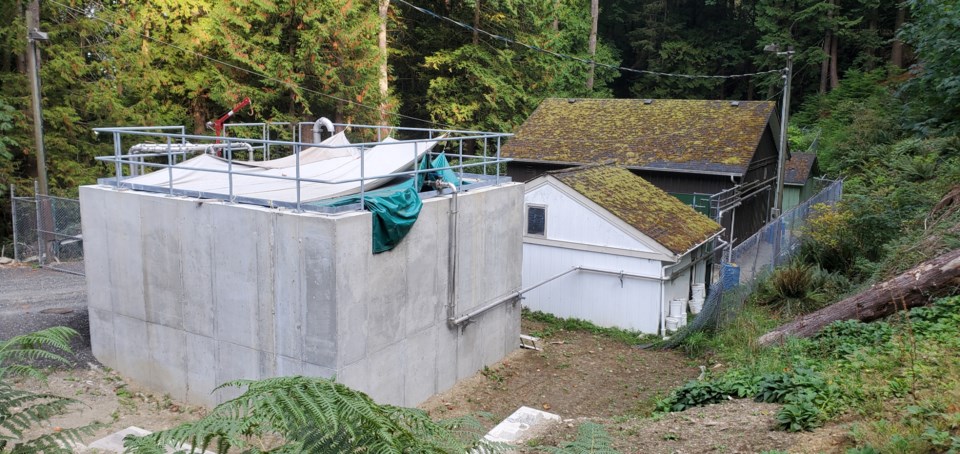It will cost seven figures to replace a broken outfall pipe at the Snug Cove Wastewater Treatment Plant.
The role of the outfall pipe is to dispose of effluent after it has been treated at the wastewater plant (WWTP). The effluent is then discharged in deep water past Dorman Point.
Multiple issues developed with the pipe last summer however which has prevented it from fulfilling this task. Two ruptures required underwater dive teams being sent down to repair the pipe, along with some shore cleanup. Finally in August the pipe became so twisted that it stopped discharging effluent altogether. Around one-third of the pipe had to be cut off to allow wastewater discharge to continue, meaning the effluent is currently being released into Snug Cove waters instead of offshore.
The current situation puts the municipality in violation of the BC Environmental Management Act with regards to their discharge permit. In order to get back up to code the project was brought forward in this year’s budget discussions. The total cost to replace the pipe will be around $1.2 million.
Part of the issue is that the current outfall pipe is 75 millimetres, which worked at the time of installation but has since become far too small for the increased number of users in Snug Cove. Director of engineering Patrick Graham said the replacement pipe should be at least 200 mm, and even went further by proposing a 250 mm pipe to account for growth over the next 40 years.
The larger pipes will also operate by gravity discharge, as opposed to the current pipe which requires a pump to move effluent through it.
Almost the entire cost of replacement will be borne by existing users of the Snug Cove Local Service Area (LSA), which will work out to an annual parcel tax of around $533 per year for the approximately 135 properties in the area, based on a 30-year loan. The amount to go from a 200 to 250 mm pipe, about $100,000, will be paid by latecomer agreements and future development around the island.
This new parcel tax is in addition to the one Snug Cove LSA users are already paying for WWTP upgrades approved in 2022. That tax works out to around $713 a year, and has about five years left before being repaid.
Since the Snug Cove LSA doesn’t currently have reserves built up, the money to replace the outfall pipe needs to be borrowed. The borrowing will be subject to a petition against from the local service area, which would require 50 per cent of properties worth 50 per cent of the total assessed property value to quash it. Otherwise, the borrowing will be approved. The plan was approved by council 6-1, with Coun. Judith Gedye in opposition.
Mayor Andrew Leonard asked about the future prospects of the Snug Cove LSA given that property owners are now facing the reality of two parcel taxes along with the looming Phase 2 upgrades to the WWTP which are estimated around $6 million.
“I’m very concerned about the financial impact this sewer system is going to have on this local service area long-term, and whether it’s going to be financially viable for property owners,” said Leonard during council last week.
Graham said he shares the mayor’s concerns. “At this point we have a service that’s set up pursuant to a certain number of users, and we’re essentially stuck with making that work… It’s definitely a concern in that we’re looking at a substantial parcel tax here for one component of the system. It wouldn’t be prudent to create any expectation that that’s the end of the road in terms of what we have to pay to keep the service area running,” said the engineering director.
Both Graham and chief administrative officer Liam Edwards added that they didn’t believe a sewage smell detected in the area over the last few months was from the effluent itself, saying that it would have already been treated to eliminate smell at the WWTP before being discharged.
They theorized the smell could be due to the broken pipe however, as it could have disturbed the seabed when it ruptured and exposed sediment or anaerobic digestion. Graham added the smell could also be coming from waste created by boats or animals.



